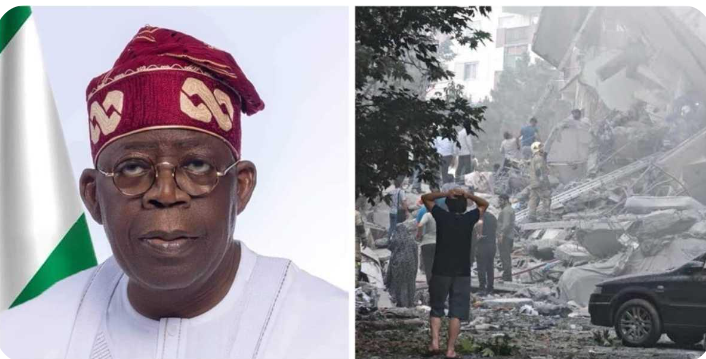
Nigeria to the World: 'Drop the Bombs, Pick Up the Phone' – FG Slams Israel's Iran Strike, Urges Immediate Ceasefire

In a bold and urgent diplomatic move that has echoed far beyond the African continent, Nigeria has publicly condemned Israel's large-scale airstrikes on Iran, calling the assault a reckless escalation with the potential to spiral into a full-blown regional war. As tensions flare across the Middle East, Nigeria’s voice has entered the global conversation with a clear message: Dialogue, not warfare, must prevail.
The Federal Government, through a strongly worded statement issued on Saturday by the spokesperson for the Ministry of Foreign Affairs, Kimiebi Ebienfa, expressed deep concern over the growing hostility between Israel and Iran. The statement, released just hours after Israel’s devastating campaign targeted nearly 100 sites across Iranian territory, including high-security military and nuclear installations, urged both countries to put down their arms and choose the path of restraint.
“The government of the Federal Republic of Nigeria condemns Israel’s preemptive strike on Iran that has led to an escalation of hostilities,” the statement read. With tension already boiling, the Nigerian government warned that the current tit-for-tat strikes are not just a local conflict—they are a fuse burning fast toward wider instability in the Middle East and beyond.
Highlighting the deadly consequences, Nigeria drew attention to the lives already lost, including several high-ranking Iranian military officials, among them General Mohammad Bagheri, the armed forces chief of staff, and Hossein Salami, commander of the Islamic Revolutionary Guard Corps. The attack, which Iran’s Supreme Leader Ayatollah Khamenei declared a “declaration of war,” has now sent shockwaves through diplomatic and military circles across the globe. Khamenei has vowed that Israel will face a “bitter and painful” retaliation, and the Iranian military has ominously stated there will be “no limits” to its response.
In the midst of this looming catastrophe, Nigeria is appealing for calm. “The continued cycle of retaliation not only endangers civilian lives but threatens to plunge the broader Middle East into further instability,” the government’s statement warned. Nigeria believes that the economic and security ramifications of this crisis could extend far beyond the region, potentially shaking the global order at a time when the world can least afford more chaos.
Reaffirming its historical commitment to peaceful conflict resolution, Nigeria emphasized that diplomacy—not drones or ballistic missiles—is the only route to real and lasting peace. “Military action is not a substitute for negotiation,” the statement asserted. This declaration resonates deeply with Nigeria’s long-standing foreign policy values: peaceful coexistence, multilateral diplomacy, and respect for international law.
To underscore the urgency of the matter, Nigeria has turned its call outward, urging the international community—especially the United Nations Security Council—to step in and help broker peace before the situation explodes beyond containment. “We urge the international community…to intensify efforts toward immediate de-escalation and to provide a platform for constructive engagement,” Nigeria’s statement urged.
This isn’t just a moment for diplomatic formality. For Nigeria, this is about upholding a principle it believes the modern world desperately needs: the prioritization of human life, dialogue, and global security over national pride and military one-upmanship. With economies still reeling from the aftermath of the pandemic, climate emergencies escalating, and humanitarian crises brewing in multiple corners of the globe, Nigeria is making a case that the world cannot afford another major war in the Middle East.
Nigeria’s position is gaining attention not only because of the severity of the current conflict but also due to the boldness of its message. While many nations have chosen carefully worded neutrality or limited criticism, Nigeria has gone one step further, putting its diplomatic weight behind an urgent global appeal for peace. It has positioned itself not just as a concerned observer but as an active proponent of multilateral peace efforts.
The country’s readiness to support genuine efforts to defuse the conflict was made clear in the final part of the statement: “Nigeria stands ready to support all genuine efforts aimed at de-escalating tensions and promoting peace in the region.” This gesture places Nigeria in the growing chorus of nations alarmed by the rapidly deteriorating situation, but also eager to prevent it from becoming the next devastating war theater.
Israel’s strike, which reportedly came after weeks of rising threats and counter-threats between the two nations, has now put the entire region on edge. Countries across the globe are monitoring the situation minute-by-minute, with many calling emergency meetings, updating military postures, and preparing for potential refugee waves and economic fallout. The oil markets are already reacting, as fears grow over supply disruptions and a possible blockade of critical shipping lanes.
Meanwhile, humanitarian agencies are bracing for the worst. Civilians in both countries are already experiencing the anxiety and dislocation that come with active warfare, and the idea that more retaliatory strikes could occur in the coming days is deepening global concern. If Iran retaliates with the same intensity, the Middle East could become engulfed in a war not seen since the early 2000s—this time between two well-armed nations with deep ideological divides and a history of proxy conflicts that span decades.
In the heart of Africa, Nigeria is standing tall and vocal. While not a direct participant in the conflict, the country understands that no region is immune from the shockwaves of war. Whether through disrupted trade routes, energy market volatility, or increasing diplomatic tensions, the effects of a major Middle East war would be global. That’s why Nigeria’s government is choosing to act now—lending its voice in the hopes that others will follow suit and pressure both sides to reconsider their course.
In a time when diplomacy often gets drowned out by the sound of airstrikes and nationalist rhetoric, Nigeria is betting on the power of words. It's urging Israel and Iran—and the world at large—to remember that wars may start with missiles, but they only end with dialogue. Whether anyone listens, however, is the question on everyone’s mind.


